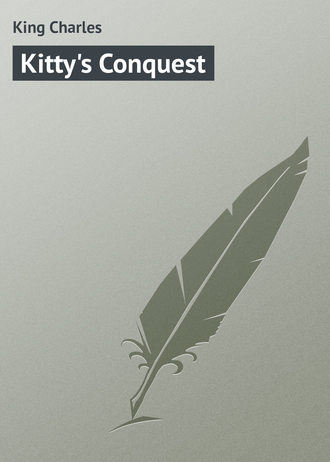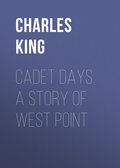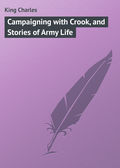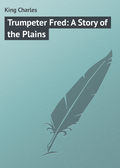
King Charles
Kitty's Conquest
CHAPTER XI
Later in the night, after the ladies had retired, Harrod and I once more walked down to the square to see how things were going on. All was very quiet. A battalion of regular infantry had stacked its arms in the middle of the street in front of the dismantled station-house; the men were seated along the curbstone; some in their weariness were lying asleep upon the stone pavement; the officers, grouped under the archways of the old police court on the other side of the street, were puffing their cigarettes and sleepily discussing the situation. Major Williams and his command were not there; the battalion on duty was one which had been for some time past stationed at Jackson Barracks below the city. A little farther down we came upon Amory and his troop making a night of it in front of the Cathedral. The horses were still saddled, though with loosened girths, but had been unbitted, and were busily munching at the hay spread before them on the pavement. Mars himself was seated on the curbstone with a grain-sack in his lap, petting his horse's head as that quadruped blissfully devoured the oats with which his thoughtful master had heaped the sack. Harrod hailed him gleefully.
"That takes a fellow back to old times, lad, only oats were scarcer than horses."
Mars held out his unoccupied hand, looking up with rather a tired smile on his face.
"How's Vinton?" he asked.
"Very much better, we think," said Harrod, "though he is very weak, and has had an ugly siege. I think he will be housed some time yet."
"Did you see – did you happen to hear of any letter for me at Sandbrook before you came away? I told them to forward everything, but nothing has come."
"No," replied Harrod. "Had there been anything I think they would have told us, though it may be that letters were simply re-directed and dropped in the Corinth mail."
There was so much anxiety in Amory's face that it suddenly occurred to me to ask, "Your mother is not ill, I hope? You have heard from her?"
"Mother is quite well, thanks. I had telegraphed her of our move, and a letter reached me yesterday. This was – I rather expected another letter." And even in the pale moonlight it was plain that Mr. Amory was blushing vividly. Instantly I was reminded of the letter he had received at camp, and received with such evident excitement. Was it from that source he now looked for another? If so, what did it mean? Mars was getting to be a mystery.
"When are you coming to see us?" asked the colonel.
"I don't know. I'd like to come at once, but you see how I'm fixed, – the only officer with the troop."
"Well, if all should be quiet to-morrow, come and dine with us at Moreau's at six, will you?" persisted Harrod. "There will be no one but ourselves and the ladies, you know; and if you are pressed for time just meet us there. We'll expect you."
"I would be delighted to," answered the young fellow, though in a strangely embarrassed and hesitating way, "but I really cannot promise. You see how it is, don't you?" he continued, looking almost appealingly at me; but I chose not to "see how it was," and only insisted on seconding Harrod's invitation. All the old Adam in me was wild with curiosity to see him with Kitty once more, and his reluctance or hesitancy was something that only served to make me more persistent. Have you never noticed that amiable trait in many a man or woman who, having passed the meridian of life him- or herself, seems bent on directing in the most trivial matters the plans and movements of younger persons? It was no earthly business of mine, and yet I was determined to have Mars come and see Kitty whether he wanted to or not. Harrod, of course, was actuated by no such motives.
Early on the following day, on going to my office, the few letters deposited on the desk were naturally the first things to be disposed of. Almost wearily I glanced at the superscriptions, for nobody in New Orleans felt particularly business-like that morning. Some were from correspondents up the railway; others from "down the coast." I simply glanced at their envelopes, and had just about completed the list, when suddenly hand and eye rested upon a dainty little missive, an envelope of creamy white, and addressed to me – to me in the very handwriting that had so attracted my attention and curiosity in Amory's tent at Sandbrook. Here was the same exquisite chirography. I knew I had seen it before. I knew now why it seemed so familiar then. For six years or thereabouts it had not fallen under my gaze; and when it did, six years before, it was only that a proud papa might exhibit to me the beautiful writing of his daughter, then in her last year at school in New York City, the youngest child of a sister long since dead. It was the handwriting of my pretty niece, Bella Grayson, – Bella, whom I had not seen since her girlhood, and all at once it flashed across my perturbed brain that Frank Amory's mysterious correspondent was this self-same Bella. Here was a revelation indeed!
For some minutes I was too much confounded to open the letter. Then I proceeded to read it. A very bright, graceful, well-expressed note it proved to be. Uncle George was appropriately reminded that it was more than two years since he had written to papa. Papa did not propose to write again until his letters were answered; but, feeling a trifle uneasy while reading the accounts of the stormy times in New Orleans, and having seen occasional mention of Uncle George in connection with Ku-Klux excitements, she had been commissioned to make inquiries as to Uncle George's health and fortunes, to express the hope that Uncle George would no longer neglect them as he had, and to subscribe herself very affectionately, Uncle George's niece, Bella.
So far so good. Uncle George had very vivid recollections of Miss Bella in her graduating years, and had been vastly impressed by the vivacity, wit, and sparkle of the bright little lady who made his last visit to her father's home so pleasant a thing to look back upon. From that time to this he had never seen her, but never had she been entirely dropped from his remembrance. For four years or so he had occasionally occupied himself in the metaphorical selection of an appropriate wedding-present, as home letters gave indications that Miss Bella was contemplating matrimony; but it never seemed to pass the point of contemplation. Twice at least, on authoritative announcements, Miss Bella had been "engaged." A dozen times at least, if reports were to be relied upon, Miss Bella was on the verge of that social entanglement. It was in the winter of '65 that she had first begun to exercise that involuntary gift of fascination over Uncle George which seemed to involve him, as it did all masculines who came within the sphere of her movements. I say involuntary, because then and ever afterwards, Miss Bella was wont to protest that she was no more conscious of any effort or desire to attract than she was of breathing when asleep. She had spent some months of the preceding summer and autumn at West Point. She was petite, graceful, not absolutely a beauty, yet there was something about those large, clear, heavily-lashed gray eyes of hers that had all the effect and power of beauty; and even when only eighteen, as she was then, Miss Bella had learned their influence, and, involuntarily of course, how to use them. I had not been a witness of the campaign itself, but I could not live in their cosey home in the city for a week without becoming measurably aware of its results. The postman's visits to the Grayson residence were as regular as his rounds, and it often happened that letters deposited on the hall-table were left there some hours, awaiting Miss Bella's return from calls or drives or strolls with her society friends of both sexes, and that I, in search of my own mail, should look over the pile on the marble slab. There was always one postmarked West Point; there was sometimes more; and there were no less than three separate and distinct handwritings thus making frequent calls at our house. In my avuncular capacity I had ventured to say something intended to be arch with regard to those letters. It was at the breakfast-table. Miss Bella was pouring coffee, and doing it with a deft and graceful turn of the wrist that showed her slender white hand to vast advantage. For all answer she had given me one of those searching glances from under the deep lids; looked me squarely in the face, though a merry smile was hovering about the corners of her rosy mouth; and, neither admitting nor denying the correspondence, had disarmed me by a prompt inquiry as to whether I really thought it improper for her to hear from her cadet friends.
No one could ever call it a correspondence, for no one ever saw Miss Bella writing, or heard of her mailing letters to West Point or anywhere else. Between her and her devoted papa the closest sympathy and alliance existed. He seemed to take a jovial delight in Bella's fascinations. She ruled him with a winning and imperious sway that was delicious to see, and Uncle George speedily fell into the same groove, with this difference: she may have told her father who her correspondents were; she never did tell Uncle George. What was more, Uncle George never could find out. Despite several efforts to win the young lady's confidence in his somewhat bulky and blundering way, Uncle George had had to give it up. She was impenetrable as a sphinx.
And now, six years afterwards, here she reappeared in his life; and, if Uncle George was not very much mistaken, Miss Bella was the correspondent whose letter had caused Frank Amory so much excitement and emotion that last day in camp at Sandbrook. It was her letter he was so eagerly awaiting now. And all this time —
Well. To the neglect of other letters I sat at the desk pondering over this maidenly missive; then with an effort refolded and was about to close it, when my eyes were attracted by some lines on the outer page. Who was it who first said that the gist of a woman's letter would always be found in the postscript? There, on page four of the tiny note-sheet, were the words:
"P. S. – So you have met Mr. Amory of the cavalry, and you had quite an exciting adventure, too. Should you see him again pray remember me to him, though it is quite possible he has forgotten me. We were good friends during his 'first class camp.'"
Oh, Bella Grayson! "Pray remember me to him," indeed! "Quite possible he has forgotten me." Upon my word, young lady, this is too much even for a long-suffering uncle. Asking me to remember her to a young fellow with whom she was actually in correspondence at the time! For a moment I was fairly indignant; but something of the witchery of Bella's own caressing voice and manner seemed to steal from the folds of the tiny note. A dozen things that had been told me of her from time to time came floating back to my brain, and – I couldn't help it – I began to laugh.
Once, just before his coming South, Miss Bella had appeared before Uncle George in a state of indignation. A young man whom he rather liked had been one of her devotees for a month or more, and then suddenly ceased his attentions. Bella's eyes flashed as she half reluctantly related to Uncle George (in response to his urgent request) the circumstances which led to the sudden break. "He dared to say to me that, if no more attractive subject happened to be available, it was his belief I would flirt with a chimney-sweep!" and then, when Uncle George burst into a fit of uncontrollable merriment, Miss Bella had first flushed with indignation, then her irresistible sense of the humorous began to get the better of her resolution to be deeply offended, and presently she laughed too; laughed till the tears ran down her cheeks; laughed as only Bella could laugh, the most musical, ringing, delightful laugh ever heard; and then, suddenly recollecting herself, she had pronounced Uncle George an unfeeling wretch, and flounced out of the room in high dudgeon.
Now, it is contrary to all principles of story-telling to introduce an utterly new character towards the fag end of a narrative, but Mr. Brandon makes no pretensions to being a story-teller. He can only relate things as they happened; and never, until this stage of the game, had his fair niece Bella appeared as a factor in the plot so far as his knowledge went. Nevertheless, it was vividly apparent to Mr. Brandon that now at least she was destined to become a leading lady, a power behind the throne, whether she appeared in person upon the boards or not. He recalled the frequent allusions to her in the letters that used to reach him from the North in the days when he found time to keep up correspondence with the scattered family. There was a tone of almost tragic despair in the letters of one of her aunts whenever Bella was the subject under discussion. Wherever she went – and she went pretty much everywhere – Miss Grayson was the centre of a knot of admirers. Her summers were spent at West Point or on "the Sound;" her winters in New York or Syracuse; and the oddest thing about it all was that, despite her great attractiveness among the beaus of society, she retained an absolute dominion over the hearts of a little coterie of schoolmates, – a sextette of as bright and intelligent and attractive girls as Uncle George had ever seen; two of them undoubted beauties; all of them gracious and winning; yet, as though by common and tacit understanding, when Bella appeared in their midst, and the men concentrated their attentions upon her, the others contentedly, even approvingly, so it seemed, fell into the background. They had their own personal worshippers, to be sure, but they were paraded for Bella's inspection and approval before being decided upon. Two of the sisterhood married within a few years of their graduation after receiving Bella's sanction. It had even been alleged that, involuntarily as usual, Bella had diverted the growing admiration of one youth from a sister to herself; but the unruffled sweetness of the sisterly relations seemed to give the lie to that statement.
But Bella's fascinations were not so placidly accepted with the opposite sex. It had been a pet theory of hers that cadets and officers were fair game for flirtation à l'outrance. She had become involved in her very first visit to the Academy in two very serious affairs; retaining complete mastery over her own susceptibilities, while obtaining mastery as complete over those of two cadet admirers who chanced to be rather close friends. One of them, at least, had been desperately in earnest at the outset; both of them were before they got through; and Bella was, or professed to be, totally incapable of believing that they had intended more than a mere flirtation. To her credit be it said, she was grievously distressed when the actual truth came to light; but her theories were in nowise shaken, for with the following year a still more desperate victim was at her feet, while the singed moths of the previous season looked gloomily and sardonically on the throes which they had so recently suffered. It was an attribute of Bella's as marvellous as the ascendency she maintained over her sisterhood, that even in jilting an admirer she had so sweet, sympathetic, caressing, and self-reproachful a manner as to make the poor devil feel that the whole thing was his own fault, or that of his blindness; and to send him on his way comforted, perhaps enslaved. She never could succeed in absolutely and definitely disposing of a lover. New ones might come, and did come, every season of the year. She had them wherever she moved; but Bella could no more let one go than a cat could a captured mouse, – another statement at her expense that first excited her wrath and afterwards nearly convulsed her by its humorous accuracy. She would turn her back on him; lose sight of him to all appearances; but let him but display a desire for freedom; let him but make an effort to get away from the toils; and under the patte de velours was an inflexible grasp that once more stretched the victim panting at her feet.
And yet she was so winning, so plaintive, so appealing with it all! Volumes of pity and trust and sympathy beamed from Bella's clear gray eyes. Volumes of half-playful reproach and condolence in the letters she would write. "Even in bidding you go she implores you to stay," was once said of her by an exasperated yet enthralled victim, and Uncle George was quite ready to believe it.
And Bella was still unmarried; still careering over the old preserves; still maintaining, apparently, her old theory that "men are deceivers ever;" and still, to judge from recent developments, bringing down fresh victims among the too inflammable youngsters of the battalion of cadets. Now, was Frank Amory a victim in good earnest, or only a narrow escape from being one? She wrote to him, but that proved nothing: she wrote to a dozen, and all at the same time. Aunt Ethel declared of her that she was writing to two classmates an entire winter, receiving almost daily missives from both, and responding when she felt disposed; and that not until they came to be stationed at the same post; to occupy the same quarters; to make the simultaneous discovery that each had parted with his class ring; and, one never-to-be-forgotten day, that each was receiving letters from the same damsel; had either of the young fellows the faintest idea that he was not the sole possessor of such attentions. It was alleged of Bella that she could have worn a class ring on every finger if she chose; but whatever may have been her object in accepting them, it was not for purposes of self-glorification. Her most intimate friend never knew whose rings she had; never knew how many; and Bella's flirtations, whatever may have been the wide-spread destruction she effected, were subjects that never could be spoken of in her presence. A dozen men were believed to confide in her, and she held their confidence inviolable. No one of them ever extracted from her the faintest admission that she ever received a line or an attention from any one else.
Now, what in the world was I to do? Here was a complication that baffled me completely. If Mars were really smitten with my fascinating niece, how far had it gone? That he had been I could readily believe; but, whether she looked it or not, Bella must now be older than he, and probably had only been – involuntarily, as usual – amusing herself with his devotions. And now he was interested in Kitty, – of that I felt certain, – and, by Jove! I had it. He felt himself still bound by the old ties; still fettered by some real or imaginary allegiance to his West Point affinity; still – "Why, the whole thing was plain as A, B, C," thought I, in my masculine profundity. "Bella would not accept, could not discard him, and here she has kept him dangling at her beck and call ever since." I decided to write to Bella, – oh, the bewildering idiocy of some men! – and I wrote forthwith.
That evening a letter winding up as follows was on its way northward:
"Yes, I have met your friend, young Amory; have seen a good deal of him, in fact, and am greatly interested in him. He strikes me as a gallant young soldier and gentleman, and his evident admiration for a fair young friend of mine – an heiress, by the way – commands my entire sympathy. I've half a mind to take you into my confidence, Bella, for perhaps you can dispel my perplexity. I think– mind you, I only say I think– that the young people are quite ready to fall in love with one another. They have been thrown together under most romantic circumstances, but he has behaved very oddly of late, and I could not but indulge in some theory as to the cause. I have learned that he has some young lady correspondent up North, and, knowing what susceptible fellows cadets are (from your own statements), it has occurred to me that he may have gotten into some entanglement there from which he would now gladly escape. Now, Bella, put on your thinking-cap. You have been there every summer for six or eight years (oh!), and although much above cadets now I fancy, you still retain your old ascendency over the sex. You knew Amory well, probably, and possibly he has made you a confidante of his affairs. What young girl was there to whom he was devoted? Perhaps you and I can help him out of his boyish folly and into something that is worth having."
Was there ever such a colossal ass?







